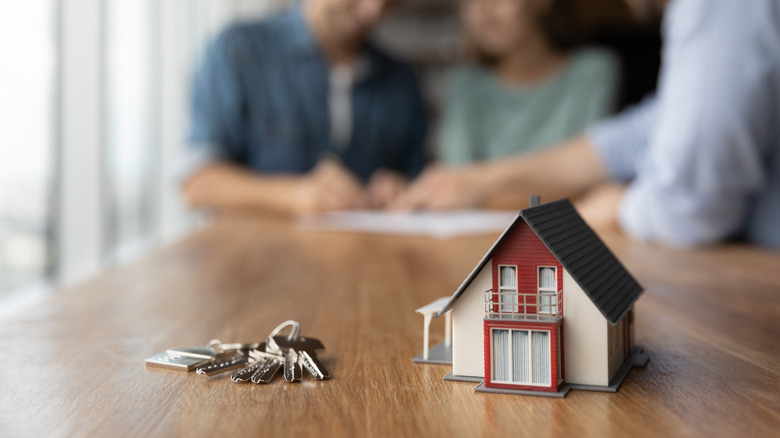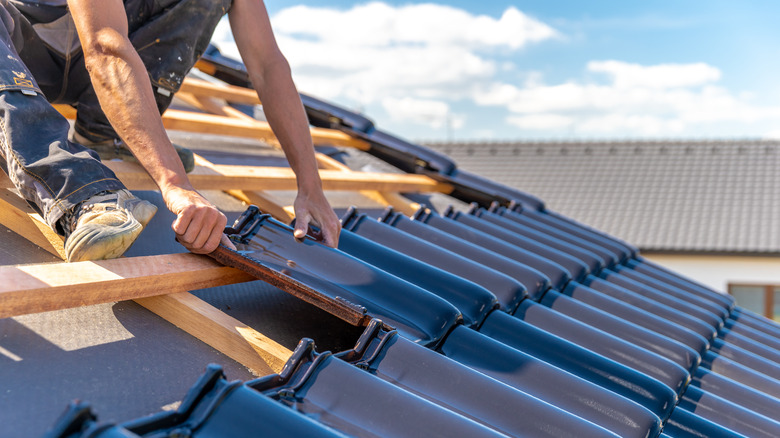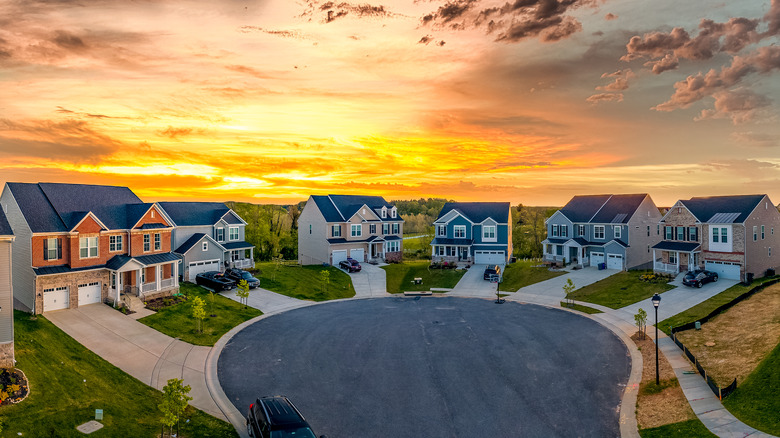A Real Estate Expert Tells Us The 5 Most Important Things To Look For When Buying A New Home
For the vast majority of people, buying a home is likely the most expensive purchase you'll ever make. Consequently, you want to make sure you get it right. You don't want to get blinded by certain features and completely ignore huge red flags that could become serious issues down the line. Sometimes, if a space seems too good to be true, it could be.
There are countless resources designed to help potential buyers through the stressful and often complicated process of buying a new home. Moversville has a 20-point checklist of factors to consider. There are also several general warning signs to be mindful of, including some that might initially not seem like bad things. For example, as Realtor.com outlines, a home filled with all kinds of pleasant scents courtesy of simmering spices or candles may seem appealing when you first walk through. However, all those scents could be designed to hide a less pleasant aroma that typically lingers in the space.
While there are definitely individual considerations every buyer will want to keep in mind when looking for their ideal space, there are several key things to look for, no matter who you are or what space you're buying. In an exclusive interview with House Digest, Brandon Zellers, a luxury real estate advisor with Spears Group, shares his expertise by flagging five important things you want to keep an eye on when searching for your new home.
Age of roof, appliances, and HVAC
Whether you're searching for a brand new construction home or an older home with a bit of character, a home's age is likely top of mind — there are pros and cons to both. However, if you've got your eye on an older home, there are a few particular things to keep in mind, according to Zellers.
"Insurance companies are cracking down on insuring homes with older roofs and appliances," he explains. "You want to make sure you're always informed on these details before moving forward with buying a home vs. finding out after the fact and having to take on those repair costs."
If you fall in love with the bones of the home and know you're planning on getting all new appliances and updating the roof right away, you might not be concerned about what you see. However, you'll want the purchase price to reflect those upgrades to come — having no surprises is key.
Even if you've bought a few homes in your lifetime and think you have some experience, it's definitely a situation where you want to bring in the experts to interpret what's going on in the space. Your realtor may even have a great recommendation for who you can talk to. "As an advisor, I always keep a trusted insurance company and inspector close by, so my buyers can call on them for any questions they have on the state of the property before moving forward," advocates Zellers.
Neighborhood comps and current value of the home
Another critical thing to remember is that you're not buying your home in a vacuum. Context is crucial, from what other properties in the neighborhood are going for to what the value of the home is (and has been in the past). Your realtor will be able to get all the information from the home's history and can flag if there are any massive jumps or falls in price that could be grounds for concern.
"With the market quickly changing, it's important you get the best deal possible to ensure you're positioned well from an equity standpoint," advises Zellers. "It's crucial as an agent to maintain market knowledge on home values and recent comps to better position yourself to negotiate for your buyer."
That's right — your realtor isn't just there to show you the homes you're interested in. They're a huge asset that can help you through the entire process. Make sure you're taking all their input into consideration, even if it can be tough to hear sometimes. For example, there might be a home you absolutely fall in love with, but if neighborhood comps are way lower in price, you may be looking at a seriously overpriced property for the area.
The more information you and your realtor have when going into the negotiation, the more power you have — and the more likely you are to get a positive outcome.
Location, location, location
If you've even thought about buying a home before, you've likely heard the standard advice that location is one of the most important places to start when narrowing down your list of criteria. There's a reason for that. With a big enough budget, you can change virtually everything within a house, stripping it down to the studs and crafting an entirely new floor plan. The one thing you can never change, no matter how much money you spend, is the location. That's why it's so critical.
"Make sure you're connecting with an informed real estate advisor who can bring data and trends into the equation before locking in a specific neighborhood," recommends Zellers. "A great example of this is with new construction. An informed agent can bring you exclusive new development opportunities that could yield an impressive 'new construction' price."
Again, you should be leaning on the expertise and connections your realtor has because they're ultimately there to help you. Though many buyers will have a good idea of the neighborhoods they're interested in, it's worth explaining what it is about these neighborhoods that appeal to you, whether it's the walkability, the general style of the homes, the amount of green space, etc. Your realtor may have a few suggestions for similar areas where you might get a bit more bang for your buck, for example.
Point of use
While a majority of home buyers on the market for a new home are looking for the dream space they'll hopefully live in themselves for years to come, there are buyers with something else in mind. Some might consider purchasing a secondary property, such as a vacation home. Others may be keeping an eye on the market with a desire to snatch up a well-priced house to use as a rental or investment property. Another one of the main factors to keep in mind, and communicate with your realtor, is how you plan to use the home you're looking to buy. That's because this will significantly change what's on your "must have" list and what the realtor considers highlighting for you.
"Will this be a primary or secondary/investment residence? How you answer that could significantly alter the search criteria and help with creating a strategic plan during the home search," explains Zellers.
Even within some of the different use categories, the exact specifics of your plan for the home could change the types of property your realtor might draw your attention to. "For example, I work with a lot of investors looking for a short term rental return. It's important for me to provide insight on which properties perform the best based on location, bedroom/bathroom count, and proximity to the beach in order for my customer to yield the highest return," clarifies Zellers.
Value add opportunities
There are many situations where you may feel fairly confident that you're planning on spending the next several decades in the home you buy next. However, you just never know — perhaps you have to move to a new city for work, or maybe the space becomes a bit too small for comfort because of your growing family. Whatever the exact situation, there's a good chance you may have to eventually sell your home, which is why you should always keep value-add opportunities in mind. The chance to add in a few extra bells and whistles could help you appeal to buyers down the road.
"Does the home need a small renovation? Could it use new furniture? Does it have additional room to add a carriage house or pool? These are a few examples of value adds to help with a home's future value," outlines Zellers.
This fact stands regardless of the location and what you're using the property for. "For example, you might find a good rental property without a pool; this creates a great value-add opportunity," Zellers adds. "In our market, on average we're seeing a 20% to 25% increase in rental numbers once a heated pool is added to the property."
It's critical to keep an open mind when looking for a new home. Sometimes, what seems like a wasted space or unremarkable feature could easily be refreshed and renovated to add some serious value to your home.





